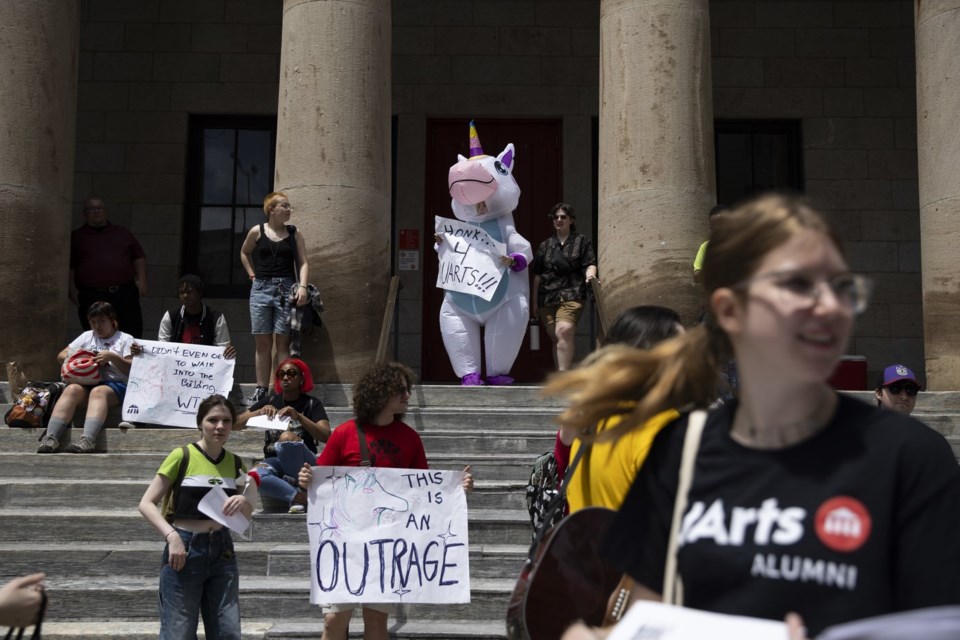PHILADELPHIA (AP) — Bryant Fleming was looking forward to the fall semester at the University of the Arts, where the rising senior was to choreograph a production of “Sister Act" — the same musical comedy that led him to fall in love with theater in high school.
Instead, the musical theater major was left heartbroken and angry over the Philadelphia school's abrupt announcement Friday that it planned to close its doors in just seven days. The decision shocked students, parents and faculty alike and raised questions about governance at the venerable city institution. University officials have not said how or why they suddenly ran out of money to pay the bills.
“You all knew what was going on, so why didn't you tell us and be up front with us and actually allow us to prepare?” Fleming said in a phone interview Wednesday. “We're all angry. ... It just hurts."
Fleming, who plans to enroll at nearby Temple University, was among hundreds of people who gathered outside of the university’s administration building this week to protest the closure, which is scheduled for Friday.
The University of the Arts, which traces its roots back nearly 150 years, has produced several Grammy- and Tony-award winning artists. It joins a long list of small, private colleges that have shut down in recent years amid demographic changes and pandemic turmoil.
Summer classes were canceled, and a new class of first-year students, many of whom had just sent in their deposits, had to scramble to find somewhere else to enroll. Philadelphia’s Temple and Drexel universities and several other schools across the country announced they would offer spots to displaced UArts students.
School employees, meanwhile, said they’ve been left in the dark about when they’ll get their final paychecks and how long they’ll have access to university email accounts and campus studios to retrieve artistic works in progress.
The quick closure “truly is unprecedented. I take no pleasure in saying I think it reflects a complete failure of UArts leadership,” said Eric Lechtzin, an attorney who has filed suit against the school on behalf of nine university employees, including faculty, staff and administrators. The plaintiffs, who seek class action status, allege UArts violated federal law by failing to provide them with 60 days' notice of their termination.
Lechtzin questioned Wednesday whether university officials took sufficient steps to respond to the school's financial challenges, such as by eliminating programs, reducing staff or selling more of the school's valuable downtown Philadelphia real estate.
Judson Aaron, chairperson of the university’s board of trustees, and UArts President Kerry Walk said in a statement that amid years of declining enrollments and revenues, the school was confronted with “significant, unanticipated expenses” that “came to light very suddenly.” They did not elaborate. Walk resigned this week.
“Despite our best efforts, we could not ultimately identify a viable path for the institution to remain open and in the service of its mission,” the school’s trustees said in a separate statement.
Parent Chris Krewson recalled getting a bill for fall tuition just hours before word of the abrupt closure leaked out. His son Owen just finished his first year in a 5-year program that combined vocal performance and music education, one he may now find hard to replicate.
Temple, where Krewson is an adjunct, has reached out about a possible transfer, but it’s not yet clear where his 19-year-old son will land in the fall. He had chosen UArts over the Berklee College of Music in Boston and thrived studying in the center of Philadelphia’s arts scene, even performing at the nearby Kimmel Center for composer Stephen Schwartz.
“This was a real sort of neutron bomb that went off in his summer,” Chris Krewson said.
“He spent the last few days calling around — calling up Berklee, calling NYU, filling out the forms for Temple to try to figure out his next move,” he said. “We’re sort of past the deadline for regular transfers.”
Krewson wonders how the board, which includes some of the city’s top business leaders and philanthropists, could have missed signs of financial distress.
The Pennsylvania attorney general's office, which has oversight over nonprofits, said it is reviewing the circumstances of the school's closure, including “any transfer or loss of assets.”
“We are very concerned by the sudden closure of University of the Arts, which has impacted students, staff, and the community,” said Brett Hambright, spokesperson for Attorney General Michelle Henry.
Temple, meanwhile, has said it's exploring a potential merger to save UArts, whose programs include art, dance, design, film, music and theater.
“Over the last several days, we have spoken with UArts representatives to explore all options and possible solutions that might help preserve the arts and the rich legacy of this 150-year-old institution," Temple President Richard Englert and Provost Gregory N. Mandel said in a statement Wednesday.
The number of college students in the U.S. had already been steadily decreasing for years before the pandemic led to a sharp drop in enrollment. Even as national numbers slowly inch back from that decline, small colleges whose budgets rely on tuition have struggled to stay afloat.
Enrollment declines have been steepest in the Northeast and Midwest amid regional population loss. Those regions also have some of the highest concentrations of colleges, leading to sharp competition for a diminishing pool of students.
At the University of the Arts, total enrollment fell from about 1,900 in the fall of 2018 to 1,300 in 2022, the latest year for which data are available from the U.S. Education Department.
The school’s enrollment has dropped by nearly half since 2009.
___
Rubinkam reported from northeastern Pennsylvania. Associated Press reporter Collin Binkley in Washington contributed to this story.
Michael Rubinkam And Maryclaire Dale, The Associated Press



